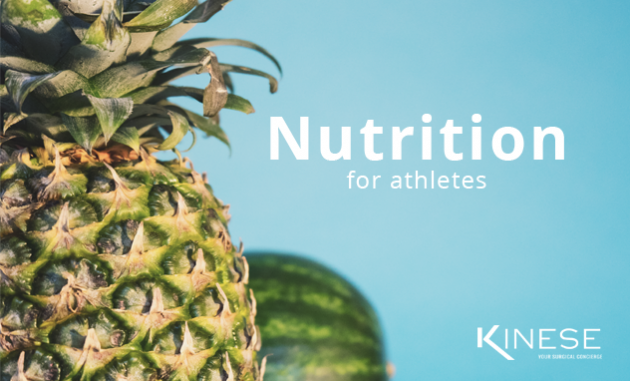Nutrition for Athletes

Part Five: Nutrition
When considering the components of injury prevention for athletes, seldom does the topic of nutrition come up as a key attribute. Understandably, elements involving athletic training, technique and physical conditioning are clear areas of focus when considering injury prevention in sport. Yet, nutrition is a critical aspect in a comprehensive injury prevention strategy. Athletes are encouraged to consider the following three rules when evaluating their nutrition program. This will help optimize performance and expedite recovery while remaining free of athletic injury.
Rule #1: Consume Enough Food
Athletes of all abilities consume a large amount of energy throughout their chosen athletic activity and training regimen. As such they must eat an appropriate amount of food to replace what has been lost through exercise. In order for nutrition to be effective in aiding in injury prevention, the body must meet its daily energy quota which requires a balance of proteins, carbohydrates and fats. Insufficient total energy intake can quickly deplete the body of nutrients, leading to fatigue. Intense training coupled with inadequate energy consequently triggers a condition known as a catabolic state. This condition is commonly associated with joint and muscle pain, slow recovery, sleepiness, and a weakened immune system. While common among athletes to feel run-down, the catabolic state can be prevented by taking in the appropriate volume of nutrition to replace what has been exhausted and to aid in the recovery process. While there is no correct formula for determining precise energy needs, an individual’s age, gender, weight, height, and physical activity level must be taken into consideration.
Rule #2: Consume Balanced & Quality Food
Not only is it important to consume enough food, but also the food with the right nutritional value. Some athletic injuries are directly correlated with nutritional imbalance. Stated differently, poor choices in eating habits day after day may result in chronic nutrient deficiencies within the body. Poor nutrition is likely to lead to exercise related fatigue, leaving athletes susceptible to injury. Therefore, a proper and balanced dietary intake of high-quality calories, carbohydrates, proteins, vitamins and minerals is important in sustaining overall health, increasing athletic performance, expediting the recovery process, and remaining injury free. Research has also proven benefits of maintaining a diet of foods rich in antioxidants and anti-inflammatory properties in order to assist in the body’s recovery process.
Rule #3: Consume Food at the Right Time
While quantity and quality are important areas to consider in a holistic nutrition plan, so is the timing by which athletes consume it. Specific to athletes, there are three areas to consider (outside of regular balanced meals) that immediately surround physical activity, fundamental to performance and recovery.
- Pre-Exercise Nutrition – Ideally, athletes should begin fueling their body between one and three hours prior to beginning exercise. This allows adequate time for nutrients to enter the body and supply energy for the demands placed on the body. As a general rule, it’s best not to eat immediately before a workout as this may not allow enough time for the body to properly digest what has just been consumed.
- Mid-Exercise Nutrition – In some cases, athletes may not actually have long enough training sessions to require mid-exercise nutrition. However, athletes such as endurance athletes, who have unusually long training sessions (in most cases well over an hour) consuming intra-workout calories and electrolytes is critical in order to prevent the body from entering into a catabolic state (discussed above). Some athletes, describe this state as “hitting a wall,” but by implementing a mid-exercise nutrition plan, this can in most cases be prevented.
- Post-Exercise Nutrition – Following physical activity, it is important to immediately begin replacing the calories burned during exercise and kick-start the recovery process. During high-intensity workouts, athletes consume a great deal of fuel. By beginning a nutrition plan immediately after a workout, muscles are primed and can easily accept nutrients which can stimulate faster muscle repair and growth.
Kinese is a company that facilitates surgical experiences for those who desire a deeper level of personalized explanation, treatment and care. We believe our clients deserve immediate access to the very best minds in medicine without having to negotiate the bureaucratic, complex and flat-out confusing systems that surround the greater healthcare market. Alongside our physicians, we promise to deliver the highest standard of care available.
